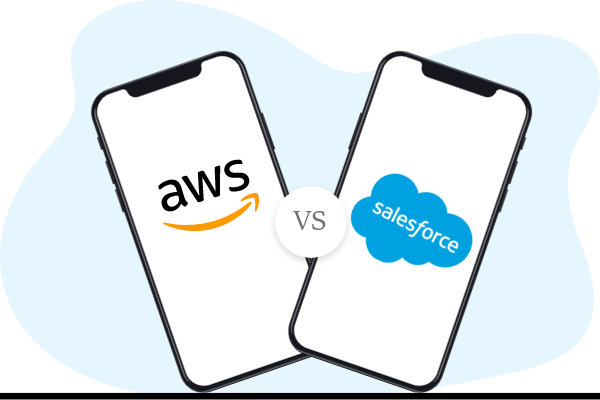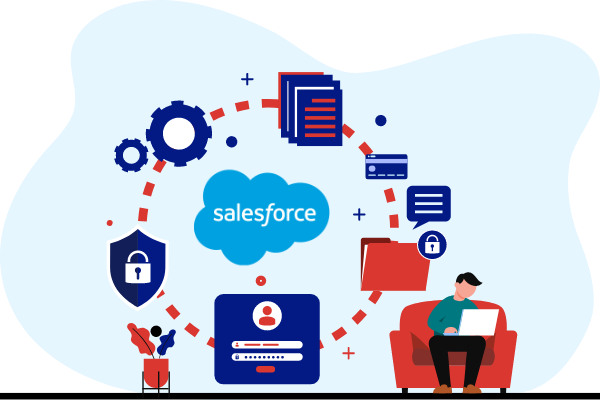Today businesses need to stay connected at all times, and for this, they need access to primary and secondary data in real time. Hence, on-site data storage is being replaced by Cloud Computing, which offers quick access to systems and information, and reduces operational costs by bringing out expenses on physical infrastructure. Several cloud computing providers are available out there, and before plunging in, businesses must evaluate carefully to make the right choice. So, which are the top cloud providers?
Top Cloud Computing Service Providers
Post-Covid-hit, most IT enterprises adopted cloud services to adapt to work-from-home scenarios and team collaboration at the same time. The cloud infrastructure transformed how IT businesses work, and it has enhanced remote work conditions & video conferences. At the same time, it offers accessibility, robust security, reliability, and flexibility to businesses. A few of the top cloud service providers are:

- Salesforce
- Amazon Web Services (AWS)
- SAP
- Google Cloud Platform
- Microsoft Azure Cloud
The two leading cloud providers are Salesforce and Amazon Web Services (AWS), among these names. As businesses are migrating from traditional software to the cloud in today’s environment, the demand is high. Salesforce & AWS allow companies to deploy web apps and manage customer engagement while offering a range of capabilities that help businesses with accelerated work performance.
Read Must: How Salesforce And Its Tools Can Be Pivotal In Increasing Customer Engagement?
In this blog, we discuss two top cloud vendors, Salesforce and Amazon Web Service. Most companies are often eager to choose these two due to the differences and similarities, and both companies have even combined to benefit from their merger. Here we have discussed the various aspects of AWS and Salesforce so that you can make the right choice for your business.
Similarities Between Salesforce And Azure
Both of these cloud platforms have a few similarities, consisting of:
- Salesforce & AWS are both cloud computing solution providers and offer valuable certifications.
- Salesforce & AWS can both handle cloud-style operations.
- Salesforce & AWS both support and favor best app deployments.
- Salesforce & AWS both stand as global leaders for their services in the cloud market. Salesforce is ideal for customer data, and AWS is suitable for cloud infrastructure.
Market Share Of AWS And Salesforce
As more and more organizations are considering migrating to the cloud, the market share of cloud computing is constantly soaring. As per the research conducted by Gartner, the total public cloud revenue was $227.8 billion in 2019, and it will grow as high as $354.6 billion by the end of 2022.
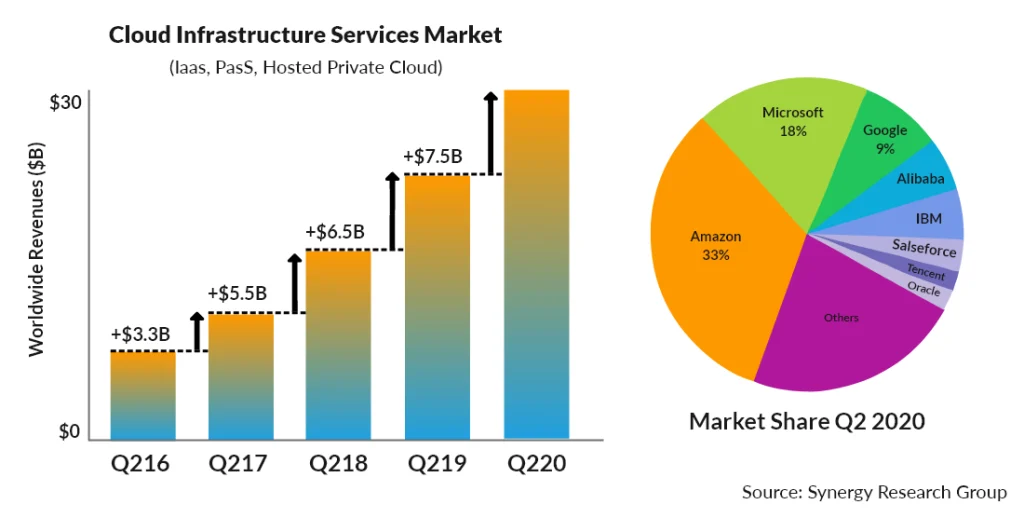
Currently, Amazon Web Services leads the market share with 33 percent, whereas Microsoft Azure stands second at 18 percent, and Google Cloud platform stands at 9 percent. As the market share is concerned, Salesforce is much behind, and presently it competes equally with other platforms like Tencent, Oracle, IBM, and Alibaba.
Amazon AWS Vs. Salesforce
Salesforce and AWS both offer cloud infrastructure to make business operations easier however, where they differ is in their primary offerings:
Salesforce is a cloud-based platform, mainly a Software-as-a-Service (SaaS) product offering readymade elements to businesses. The solutions it provides help companies enhance client interactions and generate more leads. Besides, Salesforce is a CRM to make client interactions better, and it also allows enterprises to manage leads and improve the effectiveness of their business activities. Salesforce offers several products like Marketing Cloud, Sales Cloud, Commerce Cloud, Community Cloud, etc. Salesforce integration allows a smoother business flow within various departments.
Read Must: Top Reasons To Have A Mobile App For Your Business
Amazon Web Services is a cloud computing platform that offers cloud resources to businesses. This Infrastructure-as-a-Service product provides servers to stockpile databases, frameworks, information, networking, application deployment, etc. AWS mainly focuses on offering cloud solutions to companies, and its offerings include database management, application lifecycle management, application scaling, and more. AWS works on a pay-as-you-go model, thus allowing its customers to only pay for what they use.
What Is Salesforce?
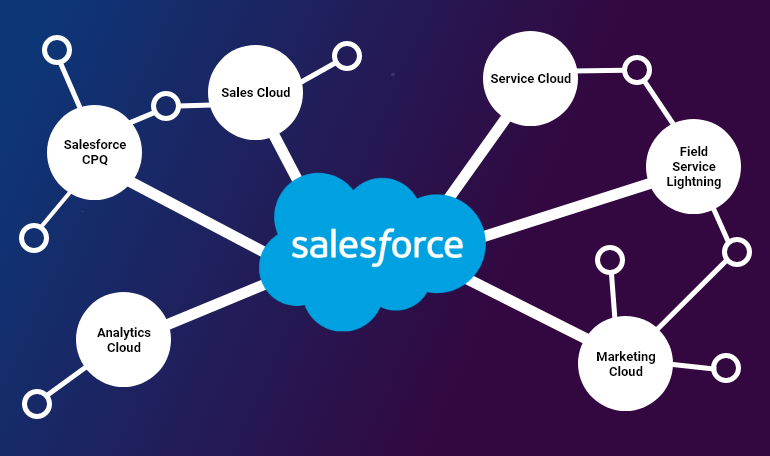
Salesforce is a client relationship management (CRM) solution. As SaaS innovation is facilitated in the cloud, Salesforce is used to help in the service of client databases to attain better client connections and interactions, as well as aids in business development. This technology is flexible, and it coordinates well with several business frameworks, and at the same time, it has been stated that CRM benefits organizations by offering the best solutions.
To keep it simple, Salesforce is a prominent CRM arrangement that offers much better ROI when utilized well. You need to find a reputed Salesforce development company to help your business.
Pros Of Salesforce Services
Salesforce offers numerous benefits for customer relationship management, and the pros consist of:
Customizations
Customizations are a lot easier with Salesforce, and it allows users to customize elements in the application as desired. Hence there is no need to adhere to a specific set of layouts.
APIs And Integrations
Salesforce services offer a plethora of APIs and integrations to simplify customer workflow. It allows integrating products with Slack, Mailchimp, JIRA, LinkedIn, G Suite, QuickBooks, etc.
CRM Scaling
Salesforce enables CRM scaling, and as your company grows, you can scale customer interactions using this technology.
Cons Of Salesforce Services
Salesforce is not a fool-proof solution to manage client interactions and connections on the cloud despite its many advantages. A few of its cons consist of:
Higher Cost
Often, small businesses and startups hesitate to adopt Salesforce integration consulting due to its high cost. It is expensive, and that may hinder its implementation.
Poor Customer Support
Salesforce lacks good customer support, and due to this reason, people facing challenges with the implementation might not get their queries quickly resolved.
Complex Configuration
Salesforce installation is a complex process, and there are a lot of initial configurations that might daunt employees from working with it.
How Much Does Salesforce Cost?
Implementing Salesforce is an expensive affair, and it might cost around $5000 for a first-time user in one year. And the licensing of this costly program is based on a per user per month. However, this solution is a pretty affordable and fair price for customers looking for various features & functionalities. At Inventcolabs, you can hire certified Salesforce developers to make customer management smooth for your business.
What Is AWS?
Amazon Web Services (AWS) are Infrastructure-as-a-service (IaaS) and Platform-as-a-Service (PaaS), and also Software-as-a-service (SaaS) to a certain extent. AWS has developed itself into the most popular cloud service supplier offering more than 100 services, comprising investigation, information, framework management, on-demand stockpiling database, and application advancement.
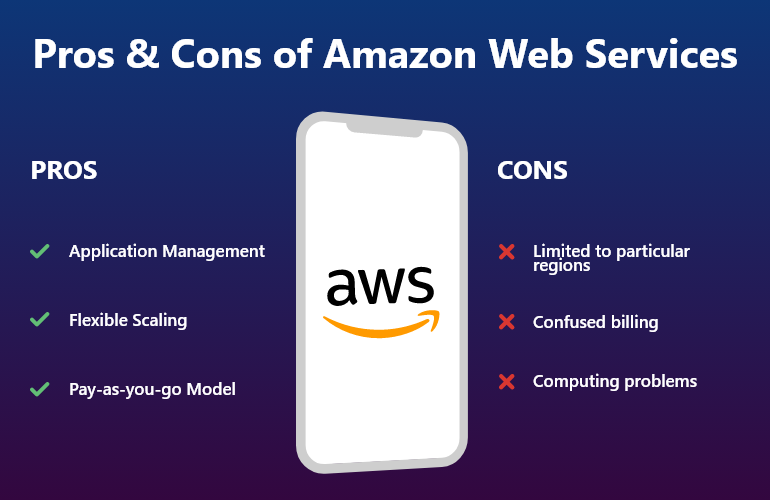
Pros Of Amazon Web Services (AWS)
Amazon Web Services is a significant cloud computing platform for businesses, with its advantages including:
Application Management
AWS cloud services enable application management, allowing businesses to deploy apps, manage app databases, and make easy modifications to the cloud itself.
Flexible Scaling
AWS enables companies to be upscale and downscale services as per their requirements. It works better instead of buying a dedicated server you’d require to pay even when not in use.
Read Must: Flutter Vs. React Native – Detailed Framework Comparison
Pay-As-You-Go Model
This model ensures that businesses pay only for what they use. Hence, it lets go of resources and saves costs on buying/renting servers for operational usage.
Cons Of AWS
The various disadvantages of Amazon Web Services include:
Limited To Particular Regions
AWS cloud solutions are limited to specific areas, so resource volumes and storage capacities differ from region to region.
Confused Billing
Many users complain about a confusing billing system that results in users receiving a high amount of bills every month. Thus, the process needs more clarity.
Computing Problems
Often, developers and engineers have reported issues with migrating to the AWS cloud and server downtime that leads to severe data problems.
Read Must: How To Create An Artificial Intelligence App?
How Much Does AWS Cost?
Each framework can be cheap or pricey, depending on person to person. Likewise, many users believe their company is charged a few hundred dollars a month, and they think AWS is a pricey affair. On the other hand, several believe that oracle licensing is bigger than AWS. Users in many states find the cost quite affordable, and some find it not expensive. It is worth noting that as a company moves from on-premises to the cloud, they generally adopt a lift-and-shift model. Hence, The companies will save costs upon migration.
Conclusion
As both Salesforce and AWS have pros and cons, they interfered in a strategic partnership in 2016 and collaborated in 2019. Together, they fill the gap between these two technologies and successfully meet all the business requirements. With Salesforce, users can easily organize their customer data, whereas AWS offers the proper infrastructure to manage the data well. However, often businesses shy away from integrating both and want to choose one between them. We would say that it depends on what range of abilities and features the company is looking for. AWS is ideal for a post-pandemic situation, allowing the entire organization to work remotely on the cloud.

In contrast, Salesforce’s CRM efficiently engages the customers and bridges the gap between the company and customers. And a business has to select what they value more. As per the market trends and demands, even though Salesforce is superior to AWS, the latter also has its advantages, so a business has to go with what they need the most.
You can go with Salesforce if your app needs high customization and scalability to make things a little simple. Salesforce is great for the marketing team as it assists in social media integration, lead nurturing, sales pipeline monitoring, and marketing leads monitoring. Salesforce is also ideal if the business data is crucial and prone to risks and threats. We at InventColabs offer quality Salesforce customization services.
On the other hand, you can choose AWS if you want to pay only for cloud services that you use, as AWS offers a pay-as-you-go payment approach. AWS is also helpful if your app needs various third-party libraries and you want to benefit from scheduled services.
You can gauge your enterprise’s requirements and choose the ideal cloud service provider.
